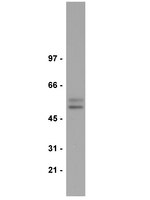07-408-25UL Sigma-AldrichAnti-Smad2/3 (rabbit immunoaffinity purified IgG)
Anti-Smad2/3 Antibody is a Rabbit Polyclonal Antibody for detection of Smad2/3 also known as MAD-mothers against decapentaplegic-homolog 2 & has been validated in WB.
More>> Anti-Smad2/3 Antibody is a Rabbit Polyclonal Antibody for detection of Smad2/3 also known as MAD-mothers against decapentaplegic-homolog 2 & has been validated in WB. Less<<Recommended Products
Overview
| Replacement Information |
|---|
| References |
|---|
| Product Information | |
|---|---|
| Format | Affinity Purified |
| Control |
|
| Presentation | Purified rabbit polyclonal IgG in buffer containing 0.07 M Tris-glycine, pH 7.4, 0.105 M NaCl, 0.035% sodium azide and 30% glycerol. |
| Quality Level | MQ100 |
| Physicochemical Information |
|---|
| Dimensions |
|---|
| Materials Information |
|---|
| Toxicological Information |
|---|
| Safety Information according to GHS |
|---|
| Safety Information |
|---|
| Packaging Information | |
|---|---|
| Material Size | 25 µL |
| Transport Information |
|---|
| Supplemental Information |
|---|
| Specifications |
|---|
| Global Trade Item Number | |
|---|---|
| Catalog Number | GTIN |
| 07-408-25UL | 04054839342813 |
Documentation
Anti-Smad2/3 (rabbit immunoaffinity purified IgG) SDS
| Title |
|---|
Anti-Smad2/3 (rabbit immunoaffinity purified IgG) Certificates of Analysis
| Title | Lot Number |
|---|---|
| Anti-Smad2/3 (rabbit immunoaffinity purified IgG) - 3204858 | 3204858 |
| Anti-Smad2/3 (rabbit immunoaffinity purified IgG) - 3931396 | 3931396 |








